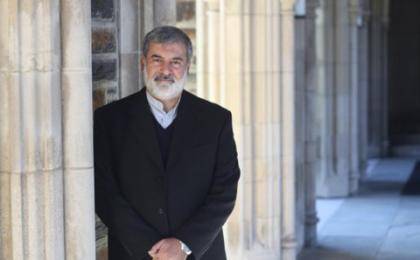
Since he began working at Duke, Mohsen Kadivar has worked closely with faculty and students both on campus and down the road a bit at UNC-Chapel Hill.
Both campuses boast small but well-regarded religious studies departments. When Kadivar joined Duke as a visiting professor in 2009, he was quickly recruited by UNC-CH to give an occasional guest lecture, and since then he has taught and mentored students at both universities.
Now, the relationship has become more formal. This fall, Kadivar will hold the Nannerl Keohane Distinguished Visiting Professorship, an appointment spanning both schools. The Islamic philosophy scholar will spend the semester teaching "Religion and Culture in Iran, 1500-Present," a course he has not taught previously, on the UNC-CH campus. It is open to undergraduate and graduate students from both universities.
A native of Iran, Kadivar holds a Ph.D. in Islamic philosophy as well as the certificate of Itjihad, the highest degree in Islamic law, which confers on him the religious title of "ayatollah."
Kadivar is a significant voice in both Iran and the larger Shiite world, experts say. An advocate of the separation of religion and the state of Iran, he has published numerous essays critical of the current Iranian regime.
"There is little doubt that he is now the most influential voice challenging the authority and legitimacy of the Iranian regime," wrote Duke professor Gilbert Merkx and UNC professor Carl Ernst in a letter endorsing Kadivar for the professorship. "His website in Persian receives 100,000 hits daily, largely from Iran, in spite of the Iranian government's efforts to block access to it."
This semester, Kadivar also will give a public lecture and engage in a series of meetings with scholars from both universities, and will continue mentoring students. He's also teaching a Muslim philosophy course at Duke.
The professorship was created in 2004 by then-UNC-CH Chancellor James Moeser to honor Keohane, who was stepping down as Duke's president. It seeks to spark collaboration between the two campuses, a desire that won't be difficult since Kadivar is already so closely tied to both places.
"There's a very good relationship between Duke and UNC," Kadivar said. "I think both campuses have benefited."
The Keohane professorship is funded by UNC-CH graduate Julian Robertson and his late wife, Josie, and by the William R. Kenan, Jr. Charitable Trust.
"We're delighted to have Professor Kadivar as the Keohane professor because the honor recognizes his unique stature as a scholar and global public intellectual," said David Morgan, chair of Duke's religious studies department. "We are happy to celebrate our colleague's distinction, in particular his work on Islamic philosophy and legal thought and his special insights on contemporary Iranian politics and society."
Kadivar's appointment will enhance an already strong collegial relationship between the two schools' religious studies faculties, said Carol Tresolini, vice provost for academic initiatives at UNC-CH.
"His presence also will support collaborations of the Duke Islamic Studies Center, the UNC Center for the Study of the Middle East and Muslim Civilizations, and other departments as well," she said. "We are so grateful to the Robertson family and the Kenan Trust for making this program possible. It has greatly enriched our two campuses since its inception in 2004."
The next Keohane visiting professor will be Donald Fullerton, an environmental economist with the National Bureau of Economic Research. He arrives in the spring. Torsten Fransson from the European Institute of Innovation and Technology in Sweden, and Susan Lederer from the University of Wisconsin will each hold the professorship in spring 2016.